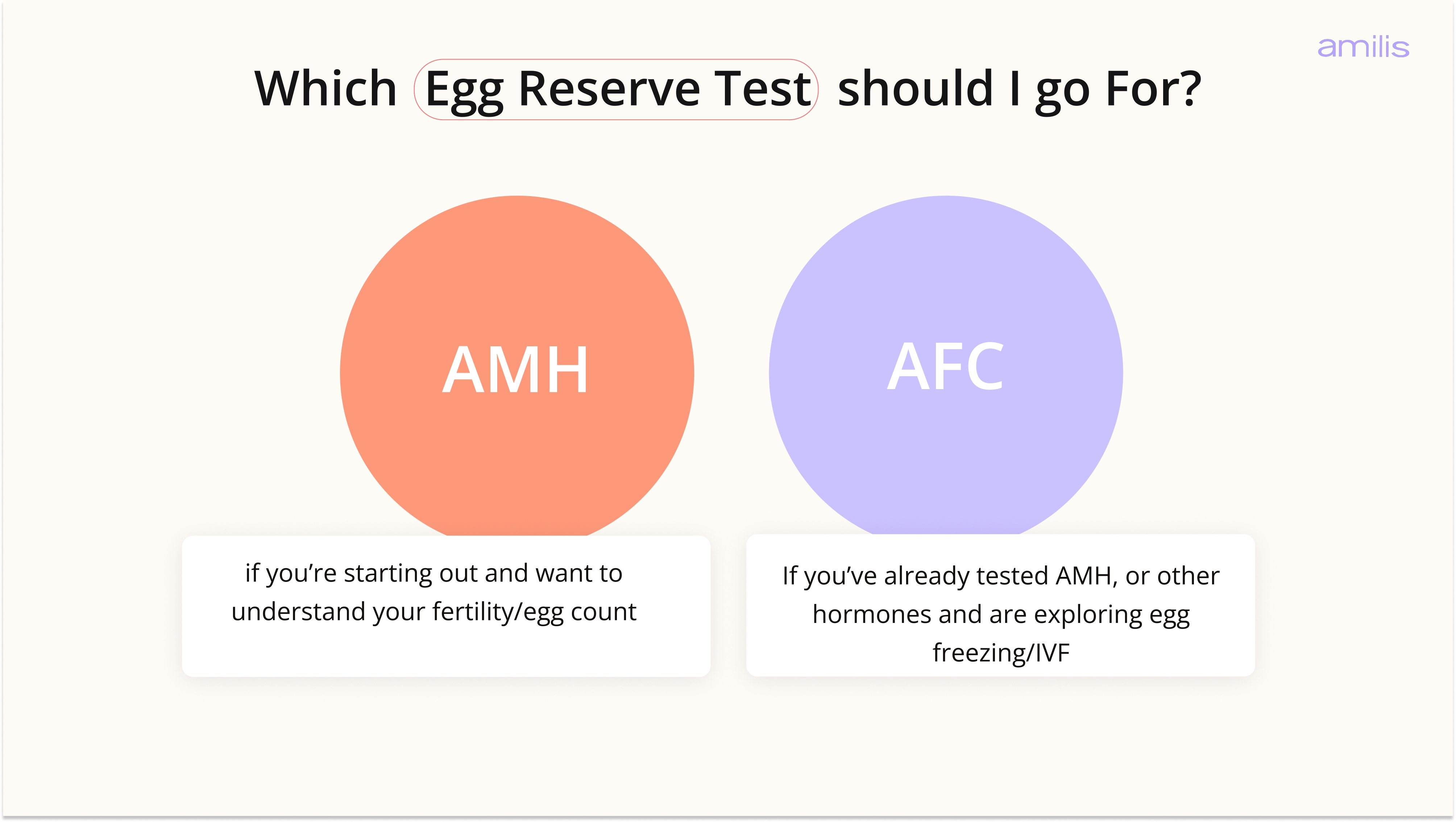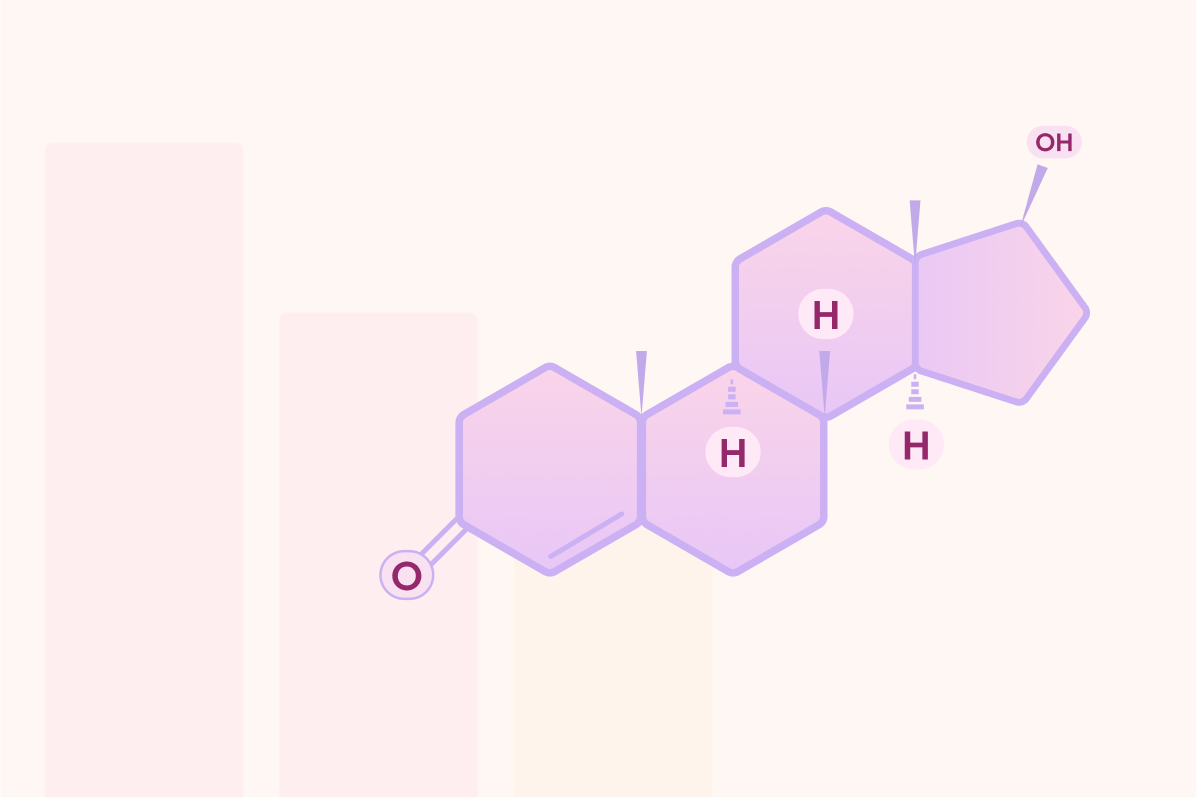In an eggshell...
- An egg count test and ovarian reserve test are the same, they help assess the ovarian reserve
- Mainly, AMH and AFC are used as the gold standard markers to check ovarian reserve
- AMH is a blood test for egg count while AFC is an ultrasound test
What if we told you, it’s possible to take a sneak peek at your fertility?
Be it in your 20s, 30s or 40s.
While there are a lot of hormones on the fertility panel that give us information, certain tests give you a direct peek of what’s happening at ground zero, the ovaries.
These are tests that can help us understand our egg count, which is directly linked to our fertility.
And these, happen to be ovarian reserve tests.
So how do they work, and when should you get one?
Let’s find out!
What is ovarian reserve testing?
Ovarian reserve tests help us know more about our ovarian reserve or egg pool, which in turn can help us assess our fertility. It can also help us detect any decline in ovarian reserve at an early enough stage. This way, you can go for any treatments or medications if desired.
The criteria for an ideal ovarian reserve test is that it has to be reproducible and display minimal variation between and within menstrual cycles.
With this benchmark, of all the hormones, the anti-mullerian hormone (AMH) blood test and the Antral follicle count (AFC) ultrasound together make up ovarian reserve testing.
Who should go for ovarian reserve testing?
As one of the best markers to understand female fertility, here are some reasons why you can opt for an ovarian reserve test:
- If you’re in your late 20s, 30s or 40s, and want to understand your fertility
- If you want to have kids in the future, but do not have a partner yet/or focusing on your career
- If you’re considering egg freezing/becoming an egg donor
- If you’re about to undergo chemotherapy/have had chemotherapy and want to preserve fertility
- If you have a medical history of genetic mutation, such as BRCA 1 (breast cancer gene), FMR1 (fragile X syndrome)
- If you’re nearing perimenopause and want to preserve fertility
- Medical history of early menopause or diminished ovarian reserve in the family
How to Check Ovarian Reserve?
Depending on the type of ovarian reserve test, it can either be a blood test or an ultrasound.
Anti-Mullerian Hormone Test
The AMH test is a blood test that gives us insight into your ovarian reserve—the number of eggs you likely have left. Its produced by growing pre-antral and small antral follicles, and it doesn’t vary much throughout and between menstrual cycles.
To understand how it works, let’s take a quick step back. Your ovaries are home to millions of follicles, and each of these tiny sacs holds an immature egg. Every month, a group of these follicles begins to grow, but usually only one goes on to release an egg during ovulation. The rest naturally break down and undergo cell death.
Now, here's where AMH (Anti-Müllerian Hormone) comes in: it's a hormone produced by the small, growing follicles in your ovaries, specifically the ones in the early “antral” stage.
The more of these follicles you recruit or ‘select’ every month, the higher your AMH levels tend to be.
So while the test doesn’t count your eggs directly, it gives a reliable estimate of how many active follicles your ovaries are working with at any given time.
Higher AMH generally suggests a larger ovarian reserve, while lower levels may indicate a reduced reserve. But remember—AMH is best interpreted along with antral follicle count, and it majorly indicates egg quantity, not quality.
“AMH is also known as a “functional ovarian reserve test” because the follicles selected in that cycle produce it” says Navya Muralidhar. “But our functional as well as overall ovarian reserve decline with age. So AMH is an accurate marker of ovarian reserve as well”
How is an AMH blood test done?
An AMH test is a simple blood test for egg count. It can be done at any point of the menstrual cycle and needs no preparation beforehand.
- Once you book an AMH test you’d have to visit the clinic
- It's a quick blood test where the nurse or healthcare provider uses a small needle to draw a blood sample from a vein in the arm
- The sample is collected in a vial and sent to the lab for analysis
Post the analysis, you should receive a report outlining your AMH levels and what they mean for your age.
Antral Follicle Count
Antral Follicle count is an ultrasound done on day 2 or 3 of the menstrual cycle that measures the number of growing antral follicles in that month. It is the sum of antral follicles (follicles of size 2-10mm) in both ovaries as observed during days 2-4 of the cycle. There is a reason why these particular follicles are considered.
“This is because as we age, these are the follicles that reduce in number, giving us an estimate of our ovarian reserve”, says Navya Muralidhar.
How is an AFC test done?
To get an AFC test done, you need to book an ultrasound appointment via Amilis or at a fertility clinic.
- A trained technician will perform the transvaginal ultrasound
- Here’s the bit you need to know about 😶🌫️As the name suggests- transvaginal- the ultrasound probe is covered with a condom and lubrication and gently inserted inside the vagina
- The probe emits ultrasound waves internally, giving us a clearer image of the ovaries compared to an external ultrasound
And while this is much different than a simple blood test, we get it, it can be a bit awkward at first 😬
However, there should not be a lot of discomfort and it should feel less invasive than a pap smear.
How to Book an Ovarian Reserve Test in the UK
Here’s how to book your egg reserve test in the UK, via Amilis
Which Egg Reserve Test should I go for?

AMH and AFC both equally work well as screening tools to assess our ovarian reserve. But the type of test you choose may depend on your goals, your age and what information you’ve had so far.
- For someone who’s just starting out and wants to understand their fertility or egg count, AMH is the test to go for. It's a quick blood test that comes with a report that helps compare your age with AMH levels and what it could mean for your fertility.
- AMH is also preferred as it has very little intra-cycle and inter-cycle variability, compared to AFC where the values may slightly fluctuate based on cycle.
- For someone who’s already tested their AMH, or gotten a full hormone panel done, or is exploring options such as egg freezing, taking an AFC test would be the next step. We highly recommend talking to a healthcare provider prior. You can also get a free doctor consultation via Amilis.
- AFC is also preferred at this stage because it is a better predictor of how many eggs can be retrieved in an egg-freezing or IVF cycle.
Ovarian Reserve Testing Cost in the UK
In the UK, an Ovarian reserve test (AMH+ AFC) can cost anywhere between £200-400 when chosen via private clinics.
In most cases, the NHS does not cover AMH testing for general fertility checks. Most people pay for it themselves unless they’re already being assessed for NHS-funded IVF or fertility treatment after trying to conceive for over a year (or six months if over 35).
In those cases, some NHS regions may include AMH testing as part of the process-depending on your ICB.
AFC tests, which use ultrasound to check your egg reserve, may also be covered depending on your local NHS policy. Some areas include it in fertility assessments, while others may require you to self-fund.
Compared to all these, there’s a much affordable and accessible option out there- when you choose to go via Amilis. With our free doctor consultations and discounted AMH tests, you can get an ovarian reserve test (AMH+AFC) at half the cost that private clinics offer.
Get your Ovarian Reserve Tested in the UK, via Amilis Fertility
About 751,000 women are waiting for gynaecological care in the UK, of which 30,000 women have been waiting more than a year for an appointment.
Be it egg freezing, getting a hormone panel done, or even an ultrasound appointment.
So at Amilis, we’re working to change this narrative and make reproductive care accessible and affordable in the UK
Here’s how:
- Get your AMH tested for just £80 and a full hormone panel for just £130 (50% cheaper than fertility clinics), discounts on AFC scans and get personalised, free reports
- Free consultations with top fertility clinics and doctors, at your convenience
- Match with fertility specialists and expert doctors for your needs, with no waiting times
And throughout, you’ll have us supporting you on your journey 👯
Figuring out where to get started? Book a free doctor consultation or take our personalised fertility quiz to know more!
We’re bridging the healthcare gap for millions of women in the UK, one day at a time 💪🏻
Frequently asked questions
1. Is there a blood test for egg count?
Yes, there is a blood test for egg reserve, and that is the AMH test. AMH is a hormone that’s produced by growing follicles and can be measured at any point during your menstrual cycle.
2. How to test your egg count?
While it's not possible to count your exact number of eggs, doctors can estimate your ovarian reserve through several methods. This typically involves blood tests to check your AMH levels, combined with an ultrasound scan to count antral follicles in your ovaries.
3. Is there an egg quality test?
Currently, there isn't a direct test for egg quality. But doctors can get clues about egg quality through several indicators. Age is the most reliable predictor of egg quality, and your doctor will consider this along with hormone testing results. If you're going through IVF, genetic testing of embryos can provide additional information. Your doctor will also look at your overall reproductive health assessment to evaluate potential egg quality.







.png)
.png)

